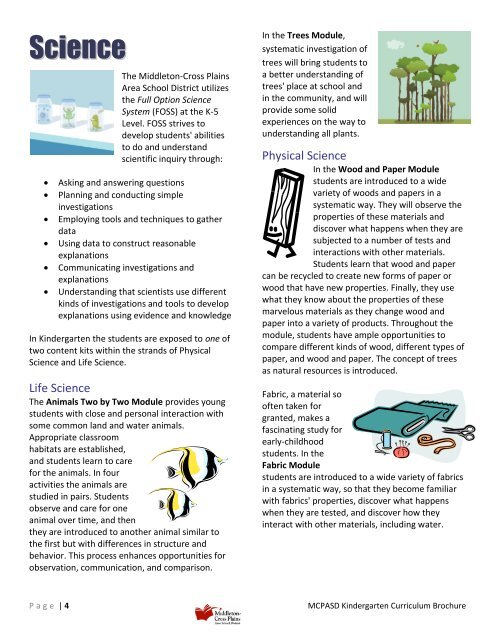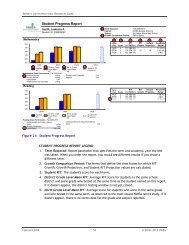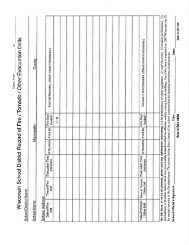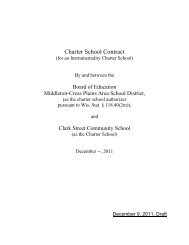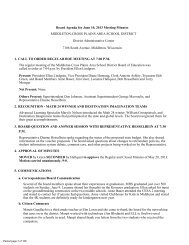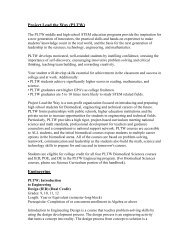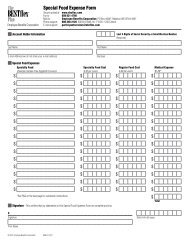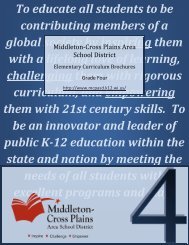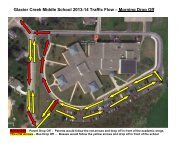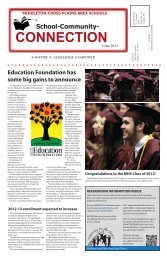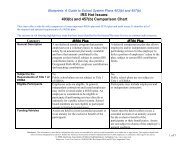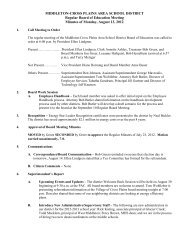Kindergarten curriculum guide - Middleton Cross Plains Area School ...
Kindergarten curriculum guide - Middleton Cross Plains Area School ...
Kindergarten curriculum guide - Middleton Cross Plains Area School ...
Create successful ePaper yourself
Turn your PDF publications into a flip-book with our unique Google optimized e-Paper software.
Science<br />
<br />
<br />
<br />
<br />
<br />
<br />
The <strong>Middleton</strong>-<strong>Cross</strong> <strong>Plains</strong><br />
<strong>Area</strong> <strong>School</strong> District utilizes<br />
the Full Option Science<br />
System (FOSS) at the K-5<br />
Level. FOSS strives to<br />
develop students' abilities<br />
to do and understand<br />
scientific inquiry through:<br />
Asking and answering questions<br />
Planning and conducting simple<br />
investigations<br />
Employing tools and techniques to gather<br />
data<br />
Using data to construct reasonable<br />
explanations<br />
Communicating investigations and<br />
explanations<br />
Understanding that scientists use different<br />
kinds of investigations and tools to develop<br />
explanations using evidence and knowledge<br />
In <strong>Kindergarten</strong> the students are exposed to one of<br />
two content kits within the strands of Physical<br />
Science and Life Science.<br />
Life Science<br />
The Animals Two by Two Module provides young<br />
students with close and personal interaction with<br />
some common land and water animals.<br />
Appropriate classroom<br />
habitats are established,<br />
and students learn to care<br />
for the animals. In four<br />
activities the animals are<br />
studied in pairs. Students<br />
observe and care for one<br />
animal over time, and then<br />
they are introduced to another animal similar to<br />
the first but with differences in structure and<br />
behavior. This process enhances opportunities for<br />
observation, communication, and comparison.<br />
In the Trees Module,<br />
systematic investigation of<br />
trees will bring students to<br />
a better understanding of<br />
trees' place at school and<br />
in the community, and will<br />
provide some solid<br />
experiences on the way to<br />
understanding all plants.<br />
Physical Science<br />
In the Wood and Paper Module<br />
students are introduced to a wide<br />
variety of woods and papers in a<br />
systematic way. They will observe the<br />
properties of these materials and<br />
discover what happens when they are<br />
subjected to a number of tests and<br />
interactions with other materials.<br />
Students learn that wood and paper<br />
can be recycled to create new forms of paper or<br />
wood that have new properties. Finally, they use<br />
what they know about the properties of these<br />
marvelous materials as they change wood and<br />
paper into a variety of products. Throughout the<br />
module, students have ample opportunities to<br />
compare different kinds of wood, different types of<br />
paper, and wood and paper. The concept of trees<br />
as natural resources is introduced.<br />
Fabric, a material so<br />
often taken for<br />
granted, makes a<br />
fascinating study for<br />
early-childhood<br />
students. In the<br />
Fabric Module<br />
students are introduced to a wide variety of fabrics<br />
in a systematic way, so that they become familiar<br />
with fabrics' properties, discover what happens<br />
when they are tested, and discover how they<br />
interact with other materials, including water.<br />
P a g e | 4<br />
MCPASD <strong>Kindergarten</strong> Curriculum Brochure


